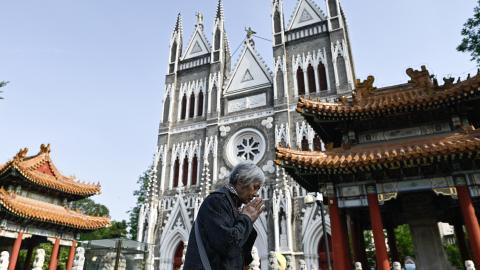Beijing’s nationwide operation against Zion Church this month resembled the kind of multicity raid typically reserved for dismantling organized crime syndicates, not a response to clergy’s alleged infringements on online worship regulations.
Over the weekend of Oct. 10, Chinese police, often in plain clothes and at night, descended across 11 cities to pluck nearly 30 pastors and other church leaders from their homes and public spaces. More than 10 officers invaded the apartment building of the 56-year-old head pastor Ezra Jin — father and father-in-law of the authors — to take him into custody for “illegal use of information networks,” based on new guidance from the State Bureau of Religious Affairs. Indications suggest the beginning of a broader crackdown on Christians, and other religious communities, across China.
But despite the severity of the Chinese Communist Party’s efforts — and in part because of it — the escalating campaign against Chinese Christians will likely backfire. CCP leaders are doubling down on the same playbook of repression that has contributed to Chinese Christianity’s growth, rather than its decline, since the time of Mao Zedong. And a push this week to unanimously pass a bipartisan resolution condemning the arrests, following an official statement from the State Department, suggests the U.S. is taking note of their repression.
Zion Church launched in 2007, at a time of far greater openness than Chairman Xi Jinping’s reign permits. A decade after its founding, the church’s five weekly services and in-house coffee shop in Beijing were not so different from many other large evangelical churches around the world. It was only in 2018 that Xi made good on his promise to “Sinicize” religion — that is, to try to coerce all religious institutions to bow to the party before God. In that crackdown, the government seized the church’s assets and barred Zion from being able to rent any meeting spaces in Beijing, forcing the church to pioneer the hybrid online worship model that the government has now set its sights on.
The CCP targets churches like Zion because it fears any civil society organizations outside of its control. Beijing’s approach to public life today is reminiscent of the nearly 2,500-year-old adage of the legalist school of Chinese statecraft, which suggests that a wise ruler “is intent on weakening the people” because “when the people are strong, the state is weak.” Any sizable network of individuals independent of the government is necessarily a threat in the eyes of CCP leadership, which wants its people isolated and pliable.
Beijing further fears the historic role churches played to channel political discontent in places like Poland and Estonia, where sermons and hymns were central features of the anti-communist movements that helped bring an end to Soviet rule. Xi is paranoid that Chinese churches could similarly facilitate organized public unrest, particularly as China faces economic headwinds. It is no coincidence that China’s last major campaign against domestic religious groups came during the last trade war and it is starting again as another looms.
And the CCP is unnerved by the fact that a religious worldview has so much mass appeal, compared with its own flagging official ideology. When churches were among the first and most successful in addressing Sichuan’s devastating 2008 earthquake, for instance, the state clamped down even on their efforts to provide aid, embarrassed that unsanctioned organizations were providing humanitarian support that the government could not.
But for the party’s own ends, campaigns like the one it is now engaged in against China’s churches are counterproductive. Mao and subsequent leaders failed to anticipate why their efforts to suppress Christianity tend to have the opposite effect. Persecution drives believers into new networks and methods of spreading their faith, growing the ranks of the faithful into the tens of millions, by some estimates now the only nationwide independent civil society network nearing the CCP in size. Zion Church is a case in point: The government’s seizure of its sanctuary catalyzed the development of new forms of online worship, expanding both its reach in daily prayer calls that often exceeded 10,000 participants, and its geographic footprint across the country.
Far from acting as a beachhead for public unrest, underground churches like Zion tend to be patriotic, mobilizing the nation they belong to toward greater acts of public support during times of crisis, through services like blood drives, counseling and rehab programs. Treating these efforts as criminal exacerbates the sort of public discontent that Beijing hopes to avoid.
There are few more obvious ways to showcase the bankruptcy of its ideology — and the vitality of the Christian faith — than by forcing peaceful believers to suffer for the sake of their convictions. It is not just Chinese who will take note. China’s image abroad is taking a hit, including in the rapidly Christianizing Global South that Beijing seeks to lead through campaigns like the Belt and Road Initiative.
There is still time for Beijing to change course. Authorities have not yet handed down official indictments of the 23 church leaders still being held in detention, which would seal their fate. We pray that they will see freedom and justice soon.
The regime expects this pressure will make Chinese Christians submit their most intimately held beliefs to the state. The pattern of history, though, has been that it will encourage more people to recognize a higher authority.


















